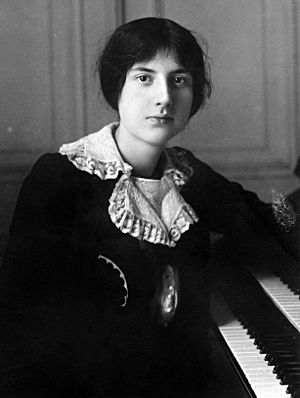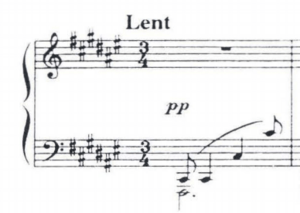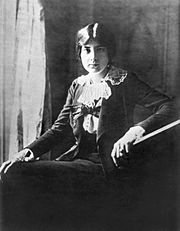Lili Boulanger facts for kids
Quick facts for kids
Lili Boulanger
|
|
|---|---|

Lili Boulanger in a 1913 photograph taken by Henri Manuel
|
|
| Born |
Marie-Juliette Olga Boulanger
21 August 1893 Paris, France
|
| Died | 15 March 1918 (aged 24) Mézy-sur-Seine, France
|
Marie-Juliette Olga "Lili" Boulanger (born August 21, 1893 – died March 15, 1918) was a talented French composer. She made history as the first woman to win the important Prix de Rome prize for music composition. Her older sister, Nadia Boulanger, was also a famous composer and a well-known music teacher.
Contents
About Lili Boulanger
Her Early Life
Lili Boulanger was born in Paris, France. She was a child prodigy, meaning she showed amazing talent from a very young age. When she was just two years old, a family friend, Gabriel Fauré, discovered she had perfect pitch. This means she could identify any musical note just by hearing it.
Her parents were both musicians and encouraged her love for music. Her mother, Raissa Myshetskaya, was a Russian princess. She married Lili's father, Ernest Boulanger, who was a music teacher. He had also won the Prix de Rome prize in 1835. Lili's father was 77 when she was born, and they were very close. Her grandfather was a famous cellist, and her grandmother was a singer.
Before she was five, Lili went with her older sister Nadia to classes at the Paris Conservatoire. Soon after, she started attending music theory classes. She also studied the organ with Louis Vierne. Lili could sing and play many instruments, including the piano, violin, cello, and harp. Some of her teachers were Marcel Tournier and Alphonse Hasselmans for harp.
Her Music Career
In 1912, Lili Boulanger entered the Prix de Rome competition. This was a very important prize for young artists. But she became ill during her performance and had to stop. She tried again in 1913, when she was 19 years old. This time, she won the composition prize for her cantata called Faust et Hélène. This made her the first woman ever to win this prestigious award. The words for the cantata were based on Goethe's famous story, Faust. Her cantata was performed many times during her short life. Winning the prize also helped her get a contract with a music publisher named Ricordi.
Lili's sister, Nadia, had tried to win the Prix de Rome four times but was not successful. She then focused on teaching. Lili studied harmony, counterpoint, and composition with Paul Vidal and Georges Caussade. The director of the Conservatoire, Gabriel Fauré, was very impressed by Lili's talent. He often brought her new songs to read.
Lili was deeply affected by her father's death in 1900. Many of her musical works explore themes of sadness and loss. Her music was known for its rich and colorful harmonies. She also used different instruments in interesting ways. You can hear influences from composers like Fauré and Claude Debussy in her pieces. Even Arthur Honegger, another famous composer, was inspired by her new ideas.
Lili and Nadia were both influenced by Debussy. They also liked similar stories and poems. Both sisters set poems by Maurice Maeterlinck to music. In 1916, Maeterlinck even allowed Lili to turn his play Princesse Maleine into an opera. It is believed that Lili almost finished the opera before she died. However, only a small part of it and some sketches have survived.
Illness and Death
Lili Boulanger suffered from a long-term illness throughout her life. It started with a serious lung infection when she was two years old. This weakened her immune system. Later, she developed intestinal tuberculosis, which sadly ended her life at just 24 years old.
Even though she loved to travel, her poor health often forced her to return home. After winning the Prix de Rome, she completed several works in Italy. During World War I, she and her sister helped organize support for French soldiers. Her last years were very productive musically. She worked hard to finish many pieces. Her opera, La princesse Maleine, was left unfinished when she died.
Lili Boulanger passed away in Mézy-sur-Seine. She was buried in a tomb at the Cimetière de Montmartre in Paris. In 1979, her sister Nadia Boulanger was buried in the same tomb. Their parents are also buried there.
Lili Boulanger's Works
Les sirènes

Les sirènes (meaning "The Sirens") was written in 1911. It is for a solo soprano singer and a three-part choir. The song is about mermaids, using words by Charles Grandmougin. This piece was first performed at one of her mother's special musical gatherings. A music critic reported that everyone loved the piece so much that it had to be played again. Lili used this work to prepare for the Prix de Rome competition. It shows her strong understanding of classical music techniques. She used these techniques as a base, adding her own unique style.
This work is dedicated to Madame Jane Engel Bathori. She was a soprano singer known for organizing concerts and supporting new artists.
Psalms
Lili Boulanger composed music for three Psalms from the Bible: Psalm 24, Psalm 129, and Psalm 130.
Psalm 24
She composed Psalm 24, titled La terre appartient à l'Eternel ("The earth is the Lord's"), in 1916. She was living in Rome at the time. This work is dedicated to Monsieur Jules Griset, who directed a choir. It was published in 1924. The music is for a choir, organ, and a brass group (like trumpets and trombones). It also includes timpani (drums) and harps. Boulanger's music uses loud brass fanfares and parts where the choir sings together in a homophonic style. This means all voices move at the same time, creating a clear sound.
Psalm 129
Psalm 129 was also written in 1916 in Rome. This psalm is longer than Psalm 24. It is composed for a full orchestra. The first time it was performed was in 1921 at the Salle Pleyel, conducted by Henri Busser.
Psalm 130
Du fond de l'abîme (Psalm 130: De Profundis / "Out of the depths") is for voice and orchestra. Lili dedicated this piece to her father's memory. She finished it when she was only 22 years old. The music sounds very mature and shows her developed style. Boulanger's psalms show her strong Catholic faith. Some people think this work was written as a response to World War I. It uses a large orchestra, including a special instrument called a sarrusophone.
Pie Jesu
Lili Boulanger completed her Pie Jesu (meaning "Merciful Jesus") in 1918, near the end of her life. However, she had started sketching ideas for it much earlier, between 1909 and 1913. Her sister, Nadia, said that Lili dictated the music to her. Some experts believe that Lili wanted to write a complete Requiem Mass (a special mass for the dead) but did not live long enough to finish it. This piece is for a high voice, string quartet, harp, and organ. It is the only one of her surviving works that uses a clearly Christian text.
Vieille prière bouddhique
This work, meaning "Old Buddhist Prayer," is for a tenor singer and choir. It is accompanied by a large orchestra. She composed it between 1914 and 1917. Like many of her works, it was not performed until after World War I, in 1921. This piece is different from her psalms because it is not based on Catholicism. Instead, it sets a daily Buddhist prayer to music.
D'un soir triste
This symphonic poem was the last piece Lili Boulanger was able to write by herself. She did not need help with the writing process.
D'un matin de printemps
This instrumental piece is one of the last works Lili Boulanger finished. Different versions were made, including one for violin and piano, one for flute and piano, and one for orchestra. Even though she completed these instrumental works, her sister Nadia reportedly added some musical directions and dynamics to them.
List of Works by Year
| Title | Year | Instrumentation | Text by |
|---|---|---|---|
| Sous-Bois | 1911 | Choir (SATB) and piano | Philippe Gille |
| Nocturne | 1911 | Violin and piano | N/A |
| Renouveau | 1911 | Vocal quartet (SATT) and piano/orchestra | Armand Silvestre |
| Les Sirènes | 1911 | Soprano, chorus and piano | Charles Grandmougin |
| Reflets | 1911 | Voice and piano | Maurice Maeterlinck |
| Prelude in D Flat | 1911 | Piano | N/A |
| Attente | 1912 | Voice and piano/orchestra | Maurice Maeterlinck |
| Hymne au Soleil | 1912 | Contralto, chorus and piano | Casimir Delavigne |
| Le Retour | 1912 | Voice and piano | Georges Delaquys |
| Pour les Funérailles | 1912 | Baritone, chorus and piano | Alfred de Musset |
| Soir sur la Plaine | 1913 | Soprano, tenor and orchestra | Albert Samain |
| Faust et Hélène | 1913 | Mezzo-soprano, tenor, baritone, chorus and orchestra | Eugène Adenis |
| D'un Jardin Clair | 1914 | Piano | N/A |
| D'un Vieux Jardin | 1914 | Piano | N/A |
| Cortège | 1914 | Violin and piano | N/A |
| Clairières dans le Ciel | 1914 | Voice and piano | Francis Jammes |
| Psaume 24 | 1916 | Chorus, organ and orchestra | N/A |
| Psaume 129 | 1916 | Baritone and orchestra | N/A |
| Dans l'immense Tristesse | 1916 | Voice and piano | Bertha Galeron de Calonne |
| Psaume 130 | 1917 | 2 solo voices, chorus, organ and orchestra | N/A |
| Vieille Prière bouddhique | 1917 | Tenor, chorus and orchestra | |
| D'un Matin de Printemps | 1918 | Violin and piano | N/A |
| Pie Jesu | 1918 | Voice, string quartet, harp and organ | |
| D'un Soir Triste | 1918 | Orchestra |
Her Legacy

In March 1939, Lili's sister Nadia Boulanger, with help from American friends, created the Lili Boulanger Memorial Fund. This fund has two main goals: to keep Lili Boulanger's music and memory alive, and to help talented musicians financially. The fund does not accept applications directly. Instead, a group of people chosen each year suggests candidates for the prize. The fund then gives the Prix Lili Boulanger to one of these musicians. The University of Massachusetts Boston manages this fund. Some past winners include Alexei Haieff (1942) and Andy Akiho (2015).
In April 1965, the Friends of Lili Boulanger Association was started in Paris. This organization later became the Nadia and Lili Boulanger International Centre (CNLB) in 2009.
Joy-Leilani Garbutt and Laura Colgate, two musicians from Washington, DC, started the Boulanger Initiative in 2018. They did this to support music composed by women, honoring both Lili and Nadia Boulanger.
An asteroid discovered in space, 1181 Lilith, was named in honor of Lili Boulanger.
There are two important books about Lili Boulanger's life. They are The Life and Works of Lili Boulanger by Léonie Rosenstiel and À la recherche de Lili Boulanger by Jérôme Spycket.
See also
 In Spanish: Lili Boulanger para niños
In Spanish: Lili Boulanger para niños
 | Lonnie Johnson |
 | Granville Woods |
 | Lewis Howard Latimer |
 | James West |

